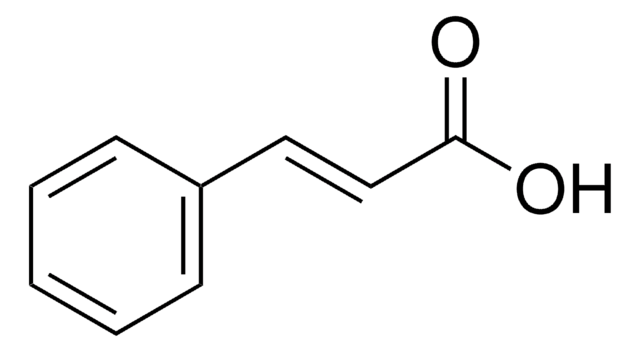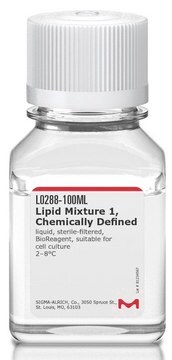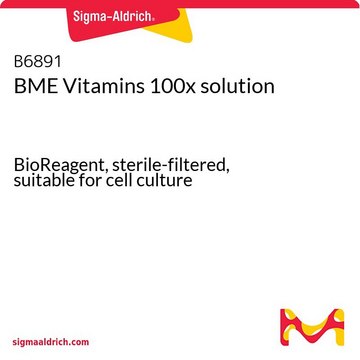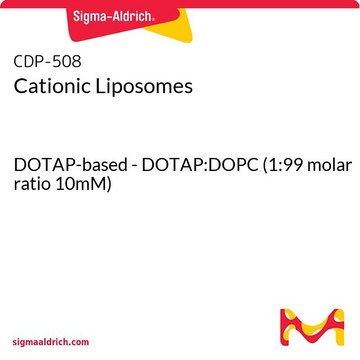おすすめの製品
フォーム
lyophilized powder
組成
16:0 Diether PC, 100%
色
white to off-white
平均粒径
100 nm
類似した製品をお探しですか? 訪問 製品比較ガイド
詳細
Lyophilized liposomes product series are freeze-dried liposomes with various types of lipids and wide range of zeta potentials and different properties. These products should be used by scientists who understand liposome formulation and have the proper equipment to check the size, separate non-encapsulated drugs and do the proper assays.
Liposomes are extensively used to study the interaction of proteins, peptides and other molecules with the surface of a lipid membrane. One of the parameters that affects this interaction is the charge of the liposomal membrane. Liposomes are always made in aqueous environment and they are sized to the desired size in liquid state using various methods such as high-pressure extrusion through nano sized pore track etch membranes. In rare occasions, liposomes are freeze dried and proliposomes are formed in the presence of a lyoprotectant such as trehalose. Using a lyoprotectant is necessary in order to maintain the size of the liposomes after rehydration.
Liposomes made from ether lipids exhibit very unique characteristics and performance: a) the ether bonds are more stable than ester linkages over a wide range of acidic or alkaline pH; b) stability properties of the liposomes is enhanced by bipolar lipids, and the saturated alkyl chains gives stability towards degradation in oxidative conditions; c) the unusual stereochemistry of the glycerol backbone enhance the resistance against the attacks by other organism phospholipases.
Phospholipase A2 (PLA2) cannot hydrolyze the ether lipid liposomes. Diether lipids do not go through hydrolysis due to having an ether bond instead of an acyl bond and therefore to do that, they are a suitable candidate for experiments that needs to be performed at a higher temperature for an extended period of time.
Liposomes are extensively used to study the interaction of proteins, peptides and other molecules with the surface of a lipid membrane. One of the parameters that affects this interaction is the charge of the liposomal membrane. Liposomes are always made in aqueous environment and they are sized to the desired size in liquid state using various methods such as high-pressure extrusion through nano sized pore track etch membranes. In rare occasions, liposomes are freeze dried and proliposomes are formed in the presence of a lyoprotectant such as trehalose. Using a lyoprotectant is necessary in order to maintain the size of the liposomes after rehydration.
Liposomes made from ether lipids exhibit very unique characteristics and performance: a) the ether bonds are more stable than ester linkages over a wide range of acidic or alkaline pH; b) stability properties of the liposomes is enhanced by bipolar lipids, and the saturated alkyl chains gives stability towards degradation in oxidative conditions; c) the unusual stereochemistry of the glycerol backbone enhance the resistance against the attacks by other organism phospholipases.
Phospholipase A2 (PLA2) cannot hydrolyze the ether lipid liposomes. Diether lipids do not go through hydrolysis due to having an ether bond instead of an acyl bond and therefore to do that, they are a suitable candidate for experiments that needs to be performed at a higher temperature for an extended period of time.
アプリケーション
- Liposomes are formed upon hydration of the lyophilized formulation. If the lyophilized liposomes are hydrated with solution containing a water-soluble drug, then a large percentage of the drug will stay outside of the liposomes and in non-encapsulated form. It is advised to use a micro dialysis cassette or a spin column using the right-side beads (depending on the size of your drug) and separate the drug encapsulated liposomes from free drug and perform the drug assay in order to calculate the encapsulation efficiency.
- Lyophilized liposomes are mainly recommended to be used with drugs that have a short life in aqueous solution mainly due to hydrolysis. After adding the solution of the drug to lyophilized liposomes, the liposomes should be used immediately.
- Lyophilized liposomes products should be used by scientists who understand liposome formulation and have the proper equipment in order to check the size, separate the non-encapsulated drug and do the proper assays.
- Trehalose is used as a lyoprotectant in all freeze-dried liposome formulation. The size distribution after hydration of the freeze-dried formulation will be around 100 nm.
- Freeze-dried liposomes should be kept at -20°C.
保管分類コード
13 - Non Combustible Solids
WGK
WGK 3
引火点(°F)
Not applicable
引火点(℃)
Not applicable
適用法令
試験研究用途を考慮した関連法令を主に挙げております。化学物質以外については、一部の情報のみ提供しています。 製品を安全かつ合法的に使用することは、使用者の義務です。最新情報により修正される場合があります。WEBの反映には時間を要することがあるため、適宜SDSをご参照ください。
Jan Code
LDE-504-5MG:
LDE-504-10MG:
最新バージョンのいずれかを選択してください:
ライフサイエンス、有機合成、材料科学、クロマトグラフィー、分析など、あらゆる分野の研究に経験のあるメンバーがおります。.
製品に関するお問い合わせはこちら(テクニカルサービス)








